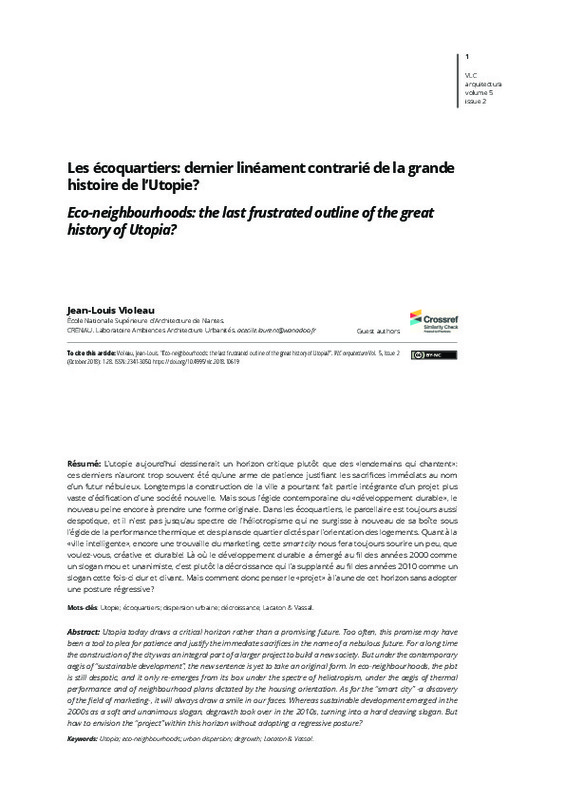JavaScript is disabled for your browser. Some features of this site may not work without it.
Buscar en RiuNet
Listar
Mi cuenta
Estadísticas
Ayuda RiuNet
Admin. UPV
Eco-neighbourhoods: the last frustrated outline of the great history of Utopia?
Mostrar el registro sencillo del ítem
Ficheros en el ítem
| dc.contributor.author | Violeau, Jean-Louis
|
es_ES |
| dc.date.accessioned | 2018-11-05T10:43:59Z | |
| dc.date.available | 2018-11-05T10:43:59Z | |
| dc.date.issued | 2018-10-31 | |
| dc.identifier.issn | 2341-3050 | |
| dc.identifier.uri | http://hdl.handle.net/10251/111865 | |
| dc.description.abstract | [EN] Utopia today draws a critical horizon rather than a promising future. Too often, this promise may have been a tool to plea for patience and justify the immediate sacrifices in the name of a nebulous future. For a long time the construction of the city was an integral part of a larger project to build a new society. But under the contemporary aegis of "sustainable development", the new sentence is yet to take an original form. In eco-neighbourhoods, the plot is still despotic, and it only re-emerges from its box under the spectre of heliotropism, under the aegis of thermal performance and of neighbourhood plans dictated by the housing orientation. As for the "smart city" -a discovery of the field of marketing-, it will always draw a smile in our faces. Whereas sustainable development emerged in the 2000s as a soft and unanimous slogan, degrowth took over in the 2010s, turning into a hard cleaving slogan. But how to envision the "project" within this horizon without adopting a regressive posture? | es_ES |
| dc.description.abstract | [FR] L’utopie aujourd’hui dessinerait un horizon critique plutôt que des «lendemains qui chantent»: ces derniers n’auront trop souvent été qu’une arme de patience justifiant les sacrifices immédiats au nom d’un futur nébuleux. Longtemps la construction de la ville a pourtant fait partie intégrante d’un projet plus vaste d’édification d’une société nouvelle. Mais sous l’égide contemporaine du «développement durable», le nouveau peine encore à prendre une forme originale. Dans les écoquartiers, le parcellaire est toujours aussi despotique, et il n’est pas jusqu’au spectre de l’héliotropisme qui ne surgisse à nouveau de sa boîte sous l’égide de la performance thermique et des plans de quartier dictés par l’orientation des logements. Quant à la «ville intelligente», encore une trouvaille du marketing, cette smart city nous fera toujours sourire un peu, que voulez-vous, créative et durable! Là où le développement durable a émergé au fil des années 2000 comme un slogan mou et unanimiste, c’est plutôt la décroissance qui l’a supplanté au fil des années 2010 comme un slogan cette fois-ci dur et clivant. Mais comment donc penser le «projet» à l’aune de cet horizon sans adopter une posture régressive ? | es_ES |
| dc.language | Inglés | es_ES |
| dc.language | Francés | es_ES |
| dc.publisher | Universitat Politècnica de València | |
| dc.relation.ispartof | VLC arquitectura. Research Journal | |
| dc.rights | Reconocimiento - No comercial (by-nc) | es_ES |
| dc.subject | Utopie | es_ES |
| dc.subject | Écoquartiers | es_ES |
| dc.subject | Dispersion urbaine | es_ES |
| dc.subject | Décroissance | es_ES |
| dc.subject | Lacaton & Vassal | es_ES |
| dc.subject | Utopia | es_ES |
| dc.subject | Eco-neighbourhoods | es_ES |
| dc.subject | Urban dispersion | es_ES |
| dc.subject | Degrowth | es_ES |
| dc.title | Eco-neighbourhoods: the last frustrated outline of the great history of Utopia? | es_ES |
| dc.type | Artículo | es_ES |
| dc.date.updated | 2018-11-05T10:34:27Z | |
| dc.identifier.doi | 10.4995/vlc.2018.10619 | |
| dc.rights.accessRights | Abierto | es_ES |
| dc.description.bibliographicCitation | Violeau, J. (2018). Eco-neighbourhoods: the last frustrated outline of the great history of Utopia?. VLC arquitectura. Research Journal. 5(2):1-28. https://doi.org/10.4995/vlc.2018.10619 | es_ES |
| dc.description.accrualMethod | SWORD | es_ES |
| dc.relation.publisherversion | https://doi.org/10.4995/vlc.2018.10619 | es_ES |
| dc.description.upvformatpinicio | 1 | es_ES |
| dc.description.upvformatpfin | 28 | es_ES |
| dc.type.version | info:eu-repo/semantics/publishedVersion | es_ES |
| dc.description.volume | 5 | |
| dc.description.issue | 2 | |
| dc.identifier.eissn | 2341-2747 | |
| dc.description.references | Abensour, Miguel. Entretien avec Sonia Dayan-Herzbrun, Anne Kupiec et Numa Murard. «L'homme est un animal utopique». Mouvements, n°45-46 dossier «Le nouvel esprit utopique» (mai-août 2006): 83. | es_ES |
| dc.description.references | Ariès, Paul et al. Non au capitalisme vert. Lyon: Parangon/Vs, 2009. | es_ES |
| dc.description.references | Benoist, Alain de. Décroissance ou toujours plus?: penser l'écologie jusqu'au bout. Paris: Pierre-Guillaume de Roux, 2018. | es_ES |
| dc.description.references | Charmes, Eric. La ville émiettée. Paris: PUF, 2011. https://doi.org/10.3917/puf.catal.2011.01 | es_ES |
| dc.description.references | Druot, Frédéric, Anne Lacaton et Jean-Philippe Vassal. Plus: la vivienda colectiva, territorio de excepción = les grands ensembles de logement, territoire d'exception = large-scale housing developments, an exceptional case. Barcelona: Gustavo Gili, 2007. | es_ES |
| dc.description.references | Gorz, André. Écologie et Politique. Paris: Seuil coll. «Points Politique», 1978. Ed. orig.: Paris: Galilée, 1975. | es_ES |
| dc.description.references | Guattari, Félix. les Trois Écologies. Paris: Galilée, 1989. | es_ES |
| dc.description.references | Mantziaras, Panos. La Ville-Paysage. Rudolf Schwarz et la dissolution des villes. Genève: MetisPresses, 2008. | es_ES |
| dc.description.references | Secchi, Bernardo. La ville du vingtième siècle. Paris: Recherches éd., 2009. Ed. orig.: Bari: Laterza, 2005. | es_ES |








